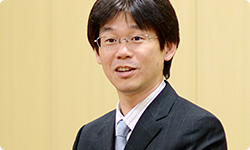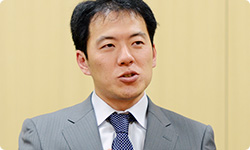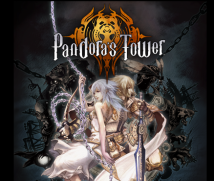5. Until I Return To Your Side
Nakano-san, this game must have undergone several turning points where drastic improvements were made before its completion. Are there any particular refinements that stick in your mind?
Let me think... When we started work on scenes with elaborate visual and audio representations, we got this solid feel for a great outcome. But while we thought that we could make it soon...
In terms of the game’s structure, it felt like we were on the right track from an early stage. But when we came to the final stages of the development, we realised that the motivation for the players to have to follow that game’s structure wasn’t there – the emotional side of things wasn’t working at all. Nakano-san is actually like Hoga-san in the sense that the story or game world side of things is not his forte.
So that goes for both of them?
I’m afraid so. It just wasn’t getting any better.
I thought it would just be a question of tweaking a few numerical codes in the program here and there, but it just wasn’t working as I’d hoped.
So the player’s emotions just weren’t engaged.
I’d tell him it just wasn’t working, but he’d insist that he could just tweak a few numerical codes and it would be fine. So I’d tell him: ‘Look, changing how someone responds emotionally isn’t a matter of changing some numbers! There’s something wrong here, so you’re going to have to roll up your sleeves and fix it!’ But still he just didn’t seem to get it! (laughs) I spent quite some time trying to persuade him to look at how to make changes that would affect the players’ emotions.

How were things looking on the project at that point?
We certainly had the gameplay firmly in place, but to be honest, I really wondered whether all was well with the heroine, Elena.
So you had doubts too.
I did. When we first started work on the game, the idea was that the character of Elena would be really appealing, and the game would revolve around her. But as it turned out, while venturing into the towers was fun, the motivation behind going there in the first place was rather weak. You’d end up neglecting Elena.
If you’re neglecting her in favour of staying in the towers, the whole concept of the game falls apart.
That’s right. No one would head back to Elena. They’d just say: ‘I’m having fun exploring the towers, so why do I have to go back?’ I asked him, “Aren’t you feeling the same way too?” and he could not deny it. Then, at Iwata-san’s suggestion, we got members of our department to play the game and get their feedback. And we got the same response again and again: ‘The towers are fun, but going back to see Elena is a real pain.’
Which meant they were rejecting the most distinctive feature of the game. (laughs bitterly)
It was at this point that a female member of staff who was playing the game articulated what became a key concern: ‘You’re trying to get the players to fall for Elena, aren’t you?’ Now, everyone has their own reasons why they’re attracted to some people and not others, so trying to create a scenario which tries to ensure the player falls for the heroine is tough. She told us: ‘People are more likely to respond if you make them feel sympathy for her plight, so they want to do what they can to help her. Isn’t it true that this kind of sympathy can be held even towards animals and machines?’ It was then that the penny finally dropped.
So she really taught you something.
Yes she did. Then I recalled the image that Yamakura-san had been trying to get across in her initial plans and was convinced, ‘This isn’t about love. It’s about the player feeling sympathy and compassion.’ That’s when I said: ‘Nakano! I’ve got it! This is what we’re after!’
(laughter)
We decided to do whatever it took, changing every cinematic scene that needed changing, and making a lot of modifications to Elena’s lines and behaviour. As a result of this, Elena’s appearance after she’d been transformed into a beast completely changed, meaning we had to discard almost all of the scenes we’d created up to that point.
The initial images we’d created for Elena following her transformation could have been seen by the player as looking quite cool. That’s why we went back to the drawing board, altering things so the player would sympathise with her plight.

That was just a year ago. It was a real frenzied effort to make all those changes.
But it made a huge difference and was well worth it in the end.
Right. After that, even just watching the first scene, we felt that this is what we’d wanted to achieve all along, ever since we saw those initial plans. Finally, the game system and the game world were perfectly balanced and you thought: ‘I need to get back for Elena’s sake!’
It fits perfectly with the game’s subtitle: ‘Until I Return to Your Side’. I was very taken with that phrase right from the first time I heard it. But coming up with the game’s title wasn’t easy, was it? Editor’s note: in Europe the game has no subtitle.
No, it was quite a struggle.
I think this game may hold the record for having had the most names rejected.
I think I must have discussed it with you ten times.
The subtitle ‘Until I Return to Your Side’ was one that we proposed early on and got approval for, but it would have been a little weak by itself. But we just couldn’t settle on a main title until the very last minute.
Normally, I don’t let myself get too involved in the actual game development, but for this game, I ended up being sucked in and unable to escape. That’s how I found myself being absolutely adamant, telling Iwata-san: ‘Look, that title just doesn’t fit with the image of the game!’ (laughs)
But if a customer without any emotional attachment to the game sees a title and it doesn’t get them interested, then we’ve failed. I’d be saying: ‘Look, an ‘image’ cannot be an effective way to communicate to the customers.’ These discussions continued for some time, without any real conclusion. I’m sure Ganbarion were wondering why the title still hadn’t been approved.
We were, and we’d proposed five hundred titles. We’d keep going over the same issues again and again.
It really was very last minute. It was just two months before mastering. Editor’s note: ‘mastering’ refers to the development phase where the game’s program is ready to be forwarded for production.
But if you actually play the game, I think that you’ll understand why we chose this title in the end, and why the subtitle is ‘Until I Return to Your Side’.
